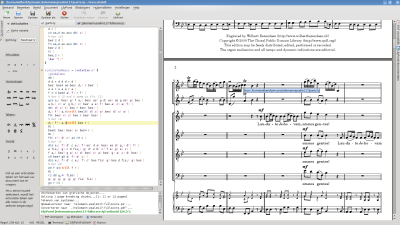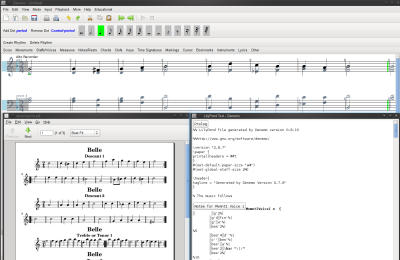Easier editing
Front-end Applications
Frescobaldi



Frescobaldi is a lightweight, yet powerful, music and text editor with many features added and enhanced particularly for LilyPond. Major features include point-and-click links between the code and music views, detailed score wizards, built-in LilyPond documentation browser, syntax highlighting and automatic completion. Frescobaldi is written in Python, with PyQt4 for its user interface, and will run on all major operating systems (GNU/Linux, Mac OS X and Windows).
Denemo



Denemo is a graphical editor which generates LilyPond source code, and also allows audio playback. It allows users to view the LilyPond source code in parallel to the graphical view. Extra LilyPond tweaks can be attached to notes, chords, etc., and are stored with the Denemo file, so that users can continue to edit graphically.
Moving the cursor in the LilyPond text moves the cursor in the graphical view, and any syntax errors in your LilyPond tweaks are highlighted in the text view when printed from there.
Browser-based editors
Hacklily
An online sheet-music editor and publishing tool powered by LilyPond, with additional features such as autocompletion and contextual help. The underlying web hosting code is available under the AGPL license, on its own development page.
www.omet.ca
Since 2010, Online Music Editing Tools (OMET) offers a ready-to-use LilyPond service with a specifically-tailored web interface. Registration is required but free of charge.
Word processor plug-ins
OOoLilyPond
https://extensions.services.openoffice.org/en/project/OOoLilyPond




An OpenOffice.org extension that converts LilyPond files into images within OpenOffice.org documents.
IDE Plug-ins
Elysium




https://github.com/thSoft/elysium
A complete environment for editing scores with LilyPond in Eclipse, offering a rich toolkit for conveniently managing LilyPond.
Text editors




Emacs
https://www.gnu.org/software/emacs/ Emacs is a text editor with language-sensitive capabilities for many different computer languages. Emacs is a highly extensible editor and can be used as an Integrated Development Environment. There is a ‘lilypond mode’ which supplies the language definitions for working with LilyPond source files. A developer has written lyqi, an Emacs major mode.
If you are not already familiar with Emacs then you may probably prefer to use a different editor for writing LilyPond input files.
More information on setting up Emacs can be found in Text editor support.
Vim
https://www.vim.org
Vim is a minimal text editor and is an extension of the older Unix
vi editor. It is also extensible and configurable.
If you are not already familiar with Vi then you may probably prefer to use a different editor for writing LilyPond input files.
More information on setting up Vim can be found in Text editor support.

TeXShop
https://pages.uoregon.edu/koch/texshop/
The TeXShop editor for MacOS X can be extended to run LilyPond,
lilypond-book and convert-ly from within the editor,
using the extensions available at:
http://users.dimi.uniud.it/~nicola.vitacolonna/home/content/lilypond-scripts
Other programs that can export LilyPond code
Score, tab and MIDI editors:
-
bwwtolily attempts to
convert a
.bwwor.bmwfile to LilyPond. While not all of the embellishments may get converted properly (this is especially true with piobaireachd), the program will list them. - Canorus, a score editor, can also export to LilyPond, but is still beta-software. Testers are welcome, though.
- Enc2ly is a GNU/Linux program which converts an Encore music score into a LilyPond one.
- go-enc2ly is a Go tool that converts Encore files to LilyPond. It was created using Felipe Castro’s research and reverse engineering by tweaking existing .enc files and loading them using the 4.55 demo version.
- NtEd, a score editor based on the Cairo library, it has experimental support for exporting to LilyPond.
- NW2LY is a C# program which converts a NoteWorthy composer song into LilyPond.
- Ripple is a program that helps create scores and parts, including a mode for mixing different musical works together in a single score or part.
- Rosegarden, an audio and MIDI sequencer, which also has a score editor for single-staff editing.
Algorithmic code generators
- Abjad, a Python API for Formalized Score Control designed to help composers build up complex pieces of LilyPond notation in an iterative and incremental way.
- FOMUS, (FOrmat MUSic) is a music notation tool for computer music composers. It is written in the Lisp programming language, and has been tested in a variety of interpreters. A C++ port is also available.
- Strasheela, an environment built on top of the The Mozart Programming System.
Other programs no longer being actively developed
- LilyBin is a web-based LilyPond editor where you can typeset your scores directly online without needing to install LilyPond. Code snippets are kept available with a unique URL, like on so-called ‘pastebin’ websites. Although https://lilybin.com, where it used to be hosted, has been discontinued, its source code continues to be freely available under the MIT license; it may be found on its GitHub page.
- WebLily was one of the first web services based on LilyPond.
- LilyPondTool was created as a plugin for the jEdit text editor.
- LilyKDE has been replaced by Frescobaldi, and exists as LilyKDE3 for KDE 3.5 and lilypond-KDE4 for KDE 4.1 only.
- LilyComp is a graphical note entry program, acting much like a number-pad which produces LilyPond notes.
- MuseScore, a score editor. LilyPond export was dropped in version 2.0 but earlier versions are still available for download at Sourceforge.
- NoteEdit, which imported MusicXML, has been forked into NtEd and Canorus.
- Rumor, a realtime monophonic MIDI-to-LilyPond converter.
- tunefl Typeset your mini-scores directly online without needing to install LilyPond locally. It allows trying out all the program’s features using a convenient web interface.
- TuxGuitar, a multitrack tablature editor and player, includes a score viewer and can export to LilyPond.
Where now?
You are now ready to Download LilyPond.
Still not convinced? Many composers, musicians, and conductors have learned how to write music in our input format. Experienced users even report that they can enter a full score in LilyPond faster than with a piano keyboard or mouse+GUI! Perhaps you would like to review the Features, Examples, or the Freedom that LilyPond provides, or read about users’ Productions and Reviews. In addition, our approach to the computational aesthetics of classical engraving is explained in our Background.
Legalese
All logos and product images are copyright and trademark acknowledged.
Tux the Linux Penguin was created by lewing@isc.tamu.edu with the Gnu Image Manipulation Program.
The FreeBSD logo is a registered trademark of The FreeBSD Foundation.
The “X image” is not a registered trademark. It was created by Nihonjoe and CyberSkull, and placed under the GNU Free Documentation License version 1.2 or later. We found the image on this Wikimedia Commons page.
The “four colored rectangles image” is not a registered trademark. It was created by Rohitbd and placed under the GNU Free Documentation License version 1.2. We found the image on this Wikimedia Commons page.

